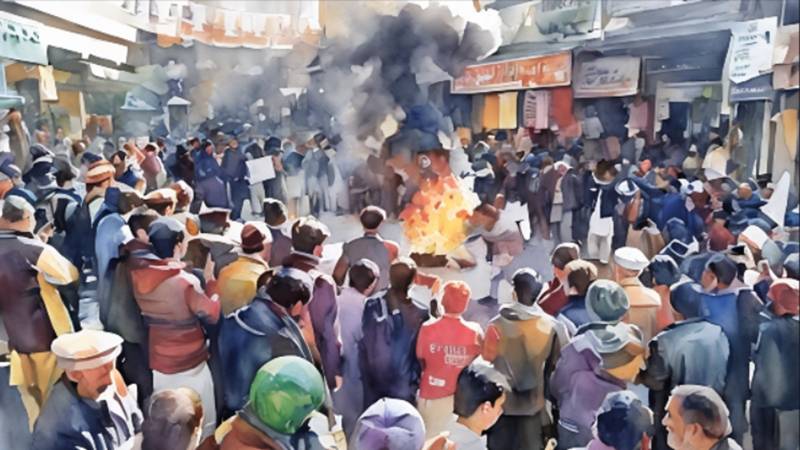
Pakistan of today is a land simmering with discontent, frustration, anger and complete lack of trust between the state and society. It was in 2010 when a common citizen of Tunisia, Mohammed Bouazizi, set himself on fire in front of the Governor House and this single act brought down the Government of President Zine El Abidine Ben Ali. This was the beginning of the “Arab Spring” – where autocratic rulers in Egypt, Libya, Algeria and Lebanon were swept away like leaves in wintry weather. Pakistan today is a very fragile society – ranking 27th on the Fragile States Index and any minor incident today could spark a revolution leading to chaos and anarchy. Already this month, a massive people’s protest movement in Gilgit Baltistan brought the government to its knees and forced it to accept all the demands of the protesting public.
The gulf between the Haves and the Have Nots is increasing rapidly and this unfortunate situation means a huge gap between the elitist few and the common people of the nation. Poverty is increasing and almost 40% of the people today are living below the poverty line. Economic and social indicators are in rapid decline and civil society is facing a crucial and critical challenge. The fight for survival and access to basic requirements of life has taken a serious turn.
The self-immolation of Mohammed Bouazizi of Tunisia was due to his tragic experience of poverty, unemployment, rising cost of living and facing humiliation at the hands of state officials. All these trials are being faced by the common people of Pakistan – and all it needs is a small spark to make the volcano erupt in an orgy of a revolution that could sweep away the entire system. The recently announced national budget has added fuel to the raging fires of discontent and anger. Trillions of rupees in assets and bank balances remain outside the tax net and the salaried classes have been further burdened with new taxes. Big businesses in real estate and agriculture continue to be the blue-eyed boys of the state and no relief is in sight for the common people.
So far, the shows of public anger and protests on the roads of Pakistan have been rather mute and not transformative or revolutionary in nature, but without doubt, unprecedented in history. This country has not experienced such events since the tragic happenings of 1971when East Pakistan became Bangladesh.
The recent demonstrations and show of outrage about the inflated electricity bills is just the tip of the iceberg and the problem is both deep-rooted and multi-faceted. The crippling cost of living has forced millions of people into extreme poverty and driven millions of young educated youth into unemployment. Political instability and the economic decline are now threatening the very existence of the state. Widespread fears are now being expressed by people about the possibility that Pakistan could implode and end up on the dust heap of history, like many failed states who collapsed in recent times. The possibility of a nuclear-powered country joining the ranks of failed states is really frightening and tragic. Tragically our political leaders and captains of the Establishment are all fairly oblivious to the looming threat and are busy in their own petty differences and silly arguments.
The debate around these problems has been totally politicised, with the opposition criticising the government for launching any operation against terrorist groups, and so there appears to be no consensus on tackling the issues
The triggers for political and social upheavals are humiliation at the hands of the state minions, and of course, a sense of hopelessness due to economic deprivations. Such conditions in any society are capable of creating a very powerful collective opposition to the ruling elites, and when people start believing that the privileged classes of society are responsible for their plight, it can lead to a mass social upheaval like the historical French Revolution.
Today we have economic managers who impose heavy taxes on the salaried class, thus further penalising a class of people who are honest tax payers, while exempting the tax on property sales for retired and serving army personnel and bureaucrats – thus creating a sense of insult and humiliation among the tax-paying middle class of the nation.
The government of the day and the opposition parties are locked in a bitter dispute and are totally ignorant or oblivious to the ground realties and the plight of the common people. The nation is faced with a myriad of economic, political and social challenges. Some of the major and serious challenges faced by the nation are a balance of payments crisis, rising inflation, debt burden, budget deficit and the creeping menace of the religious terrorism in the shape of the Pakistani Taliban.
Today the debate around these problems has been totally politicised, with the opposition criticising the government for launching any operation against the terrorist groups, and so there appears to be no consensus on tackling the issues that are destroying the very foundations of the country. Inflation increased by more than 10 % since last year, unemployment is at a frightening 15% and over 40% of Pakistanis are living below the poverty level. There is a dire and immediate need to confront and meet these challenges by strategic investments in human capital and gender equality.
There is an immediate need to improve governance at all levels, introduce accountability, clamp down on corruption and confront the dark and sinister forces of obscurantism and religious terrorism. By hanlding these issues with determination, Pakistan can pave the way for inclusive and sustainable development, ensuring a brighter future for all.

